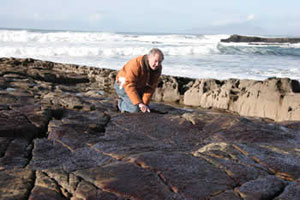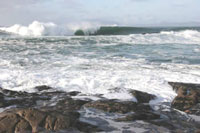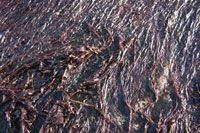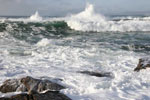



Custom Search
|
|
"People will not look forward to posterity who never look backward to their ancestors." Quotes Shops Ireland Bunús na Gaeilge Did You Know? Himself/Herself Write to Us Readers Write.. Links/Link to Us Advertise with us
Help keep us free |
 Sleabhac: Manna from the Seashore Sleabhac: Manna from the Seashoreby Joe McGowan I went down to the seashore to pick sleabhac this week and decided to share the experience with you. If I look concerned in the photo it could be because this can be a dangerous place — or it could just be that I'm wondering if the camera's self-timer has gone off! Time is getting short for anyone wishing to gather winkles, báirneachs (limpets) and other tasty mollusks that you will find here. Traditionally they can be eaten only in a month with an ‘r’ in it. This is the time of year to pick carrageen, crannach and other delicacies too. Sleabhac, an edible seaweed, grows in abundance on bare rocks in the tidal zone. It is available only at low tide. Reminiscent of the biblical manna that turned up out of nowhere to feed the Israelites, sleabhac appears only during the winter months. In another few weeks, with lengthening days and stronger sun, it will disappear and all that will remain is bare inhospitable rock. In past times this seaweed was a valuable addition to the dinner table. During famine times it, as well as dilisc, carrageen and crannac etc., helped to keep many people alive.  Sleabhac grows only in special places and is best plucked after a spell of frost. The spot where I went recently to gather it is aptly named Leac na Meala (the Honeyed Rock). Irish has long since died out as a spoken language in this area, but people still refer to seaside places by their Irish names: Pollyarry, Ros Caoireach, Leac Cam, Cromadach and so on. Every section of shore had, and still has, its own designation and a reputation for good fishing or good seaweed. Different places at different times of the year. It was as important to the last generation to know these names as it is now for shoppers to know the streets and addresses of favourite stores in our towns and cities. Sleabhac grows only in special places and is best plucked after a spell of frost. The spot where I went recently to gather it is aptly named Leac na Meala (the Honeyed Rock). Irish has long since died out as a spoken language in this area, but people still refer to seaside places by their Irish names: Pollyarry, Ros Caoireach, Leac Cam, Cromadach and so on. Every section of shore had, and still has, its own designation and a reputation for good fishing or good seaweed. Different places at different times of the year. It was as important to the last generation to know these names as it is now for shoppers to know the streets and addresses of favourite stores in our towns and cities.Much has changed in one generation in Ireland and now very few bother to gather sleabhac. It may be nowhere near as healthy or wholesome, but for busy lifestyles, food on supermarket shelves is pre-packaged and much more accessible. Even though these seaside plants are wholly organic and packed with nutrients, a new generation is growing up who never heard of them.  As I gather the dark brown weed I think of my parents and the generations before who knew when and where to look for this food and crowded the seashore until not a pick was left; a people who lived by their wits, and their intimate knowledge of Nature. They knelt in the same places that I do and gathered this delicious food that re-generates miraculously year after year. I think too of the hungry, emaciated creatures who scoured the seashore in famine times. A small bag of sleabhac, mixed perhaps with báirneachs and winkles, would keep them alive for another day. As I work, somehow, I feel their spirits are close by. As I gather the dark brown weed I think of my parents and the generations before who knew when and where to look for this food and crowded the seashore until not a pick was left; a people who lived by their wits, and their intimate knowledge of Nature. They knelt in the same places that I do and gathered this delicious food that re-generates miraculously year after year. I think too of the hungry, emaciated creatures who scoured the seashore in famine times. A small bag of sleabhac, mixed perhaps with báirneachs and winkles, would keep them alive for another day. As I work, somehow, I feel their spirits are close by. The roar of the ocean behind me is timeless and reassuring as, alone with my thoughts, I gather and reflect. ‘Never turn your back to the sea’ the old people warned us time and time again when we went to the shore. They feared and respected the waters that nurtured and fed them but, in an unguarded moment, would equally take their lives. ‘Bíonn a cuid féin ag an bhfarraige’ they believed: the sea must have its due. It was unlucky to save a drowning person. A place in the deep was destined for a corpse, someone must fill it. The rescuer must, in time, forfeit his own life in place of the life he saved. The roar of the ocean behind me is timeless and reassuring as, alone with my thoughts, I gather and reflect. ‘Never turn your back to the sea’ the old people warned us time and time again when we went to the shore. They feared and respected the waters that nurtured and fed them but, in an unguarded moment, would equally take their lives. ‘Bíonn a cuid féin ag an bhfarraige’ they believed: the sea must have its due. It was unlucky to save a drowning person. A place in the deep was destined for a corpse, someone must fill it. The rescuer must, in time, forfeit his own life in place of the life he saved.I am grateful to be here in this beautiful place and grateful for the knowledge they passed on to me. Sleek cars and power-walkers whiz by on the cliff road above, oblivious to the secrets of nature encrypted in the landscape. They stare, and perhaps they wonder at the unusual sight of a lone hunter-gatherer crouched by the waves. The Recipe Here is a recipe from 'The Cookin' Woman' by Florence Irwin: Method: Wash it thoroughly in several waters to remove grit and sand. Squeeze. Into a saucepan put enough water to cover the bottom, bring to the boil, add the sloke (sic), stir till it all boils; and then stir often till cooked, which will take 3 or 4 hours. Add pepper and salt to taste. To Dress: add some butter and cream. Eat with oatcakes for supper or with mutton and potatoes for dinner." My own favourite way to cook sleabhac is to bring to the boil and simmer for about one and a half hours. I don't find that stirring is as necessary or as frequent as indicated above. Leave overnight. Next day add boiling bacon and whole onions to suit. Season with bay-leaf and rosemary. Bring to the boil again and simmer for an hour. Add potatoes in time to cook properly, then sit back and enjoy a meal fit for a king — or a chieftain!
Reprinted by kind permission of the author.
|
The New Irish Table Margaret Johnson’s love of Ireland permeates page after glorious page of mouthwatering Irish dishes, from Smoked Salmon Chowder to Raspberry Buttermilk Tarts. Lavish color photographs of the food, the landscapes, and the people are woven through the text, making The New Irish Table the next best thing to sitting down to dinner in Ireland itself.
|
||||||||||||||
|
|
||||||||||||||||
| All contents copyright © 2001 through 2011 inclusive - all rights reserved. March 4, 2011 |
|
|
||||||||||||||